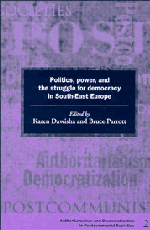Book contents
- Frontmatter
- Contents
- List of tables
- List of figures
- List of contributors
- Preface
- 1 Perspectives on postcommunist democratization
- 2 Democratization and political participation: research concepts and methodologies
- The former Yugoslavia
- 3 Embattled democracy: postcommunist Croatia in transition
- 4 Bosnia Herzegovina: a case of failed democratization
- 5 A failed transition: the case of Serbia
- 6 Democratization in Slovenia – the second stage
- 7 The Republic of Macedonia: finding its way
- Albania, Bulgaria, and Romania
- Appendix
- Index
7 - The Republic of Macedonia: finding its way
Published online by Cambridge University Press: 01 June 2011
- Frontmatter
- Contents
- List of tables
- List of figures
- List of contributors
- Preface
- 1 Perspectives on postcommunist democratization
- 2 Democratization and political participation: research concepts and methodologies
- The former Yugoslavia
- 3 Embattled democracy: postcommunist Croatia in transition
- 4 Bosnia Herzegovina: a case of failed democratization
- 5 A failed transition: the case of Serbia
- 6 Democratization in Slovenia – the second stage
- 7 The Republic of Macedonia: finding its way
- Albania, Bulgaria, and Romania
- Appendix
- Index
Summary
Macedonia declared independence from the rump Yugoslav Federation on November 21, 1991. In the transition from Yugoslav republic to the Balkan Peninsula's newest country, it carried with it the tradition of a strong leader and control by a political elite. Privatization and an ambitious effort to establish a market economy have brought significant social and economic hardships to the people of Macedonia. At the same time, tensions between ethnic Macedonians and Albanians, and problems with neighboring Greece – resulting in stunted economic growth – have made the transition even more arduous. This chapter is devoted to understanding the nature of Macedonia's democratization process and the difficulties it has faced and is facing in seeking to create a democratic state and civil society.
Some particulars
The Republic of Macedonia, with 25,713 square kilometers, is the smallest and newest Balkan country. Landlocked, it is the least developed of the former Yugoslav republics. Bordered in the north by Serbia, in the east by Bulgaria, in the south by Greece, and in the west by Albania, Macedonia is a multiethnic state, home to 2,075,196 people according to the 1994 census (see table 7.1 for some demographic trends). Ethnic Macedonians number 1,288,330 (66.5 percent), Albanians 442,914 (22.9 percent), Turks 77,252 (4 percent), Roma 43,732 (2.3 percent), Serbs 39,260 (2 percent), Muslims (Torbeši) 15,315 (.07 percent), and Vlachs 8,467 (0.004 percent). The remainder is made up of foreign nationals and small minorities, including Croatians, Bosnians, and Bulgarians.
- Type
- Chapter
- Information
- Publisher: Cambridge University PressPrint publication year: 1997
- 10
- Cited by



